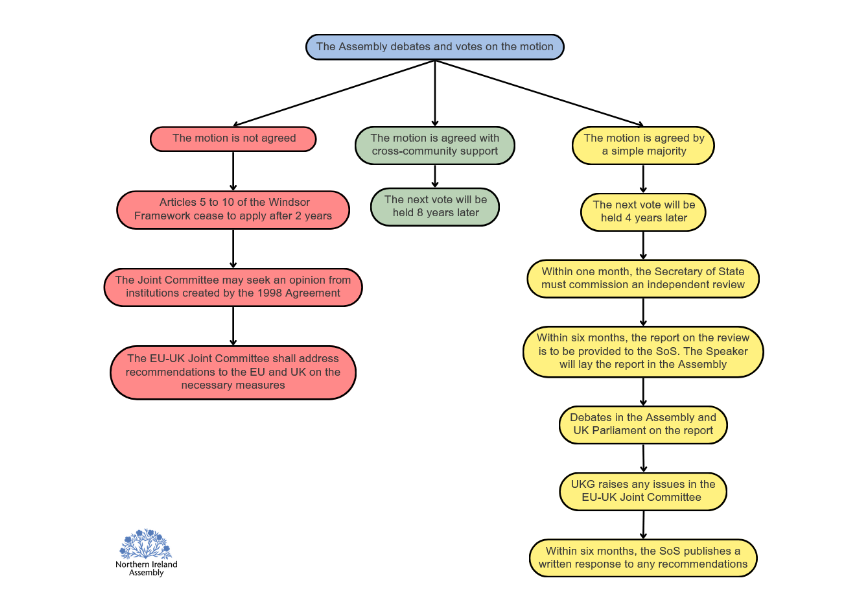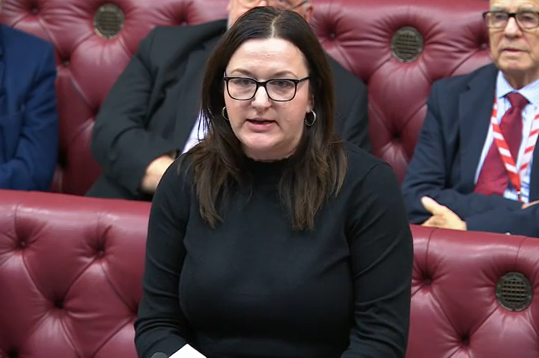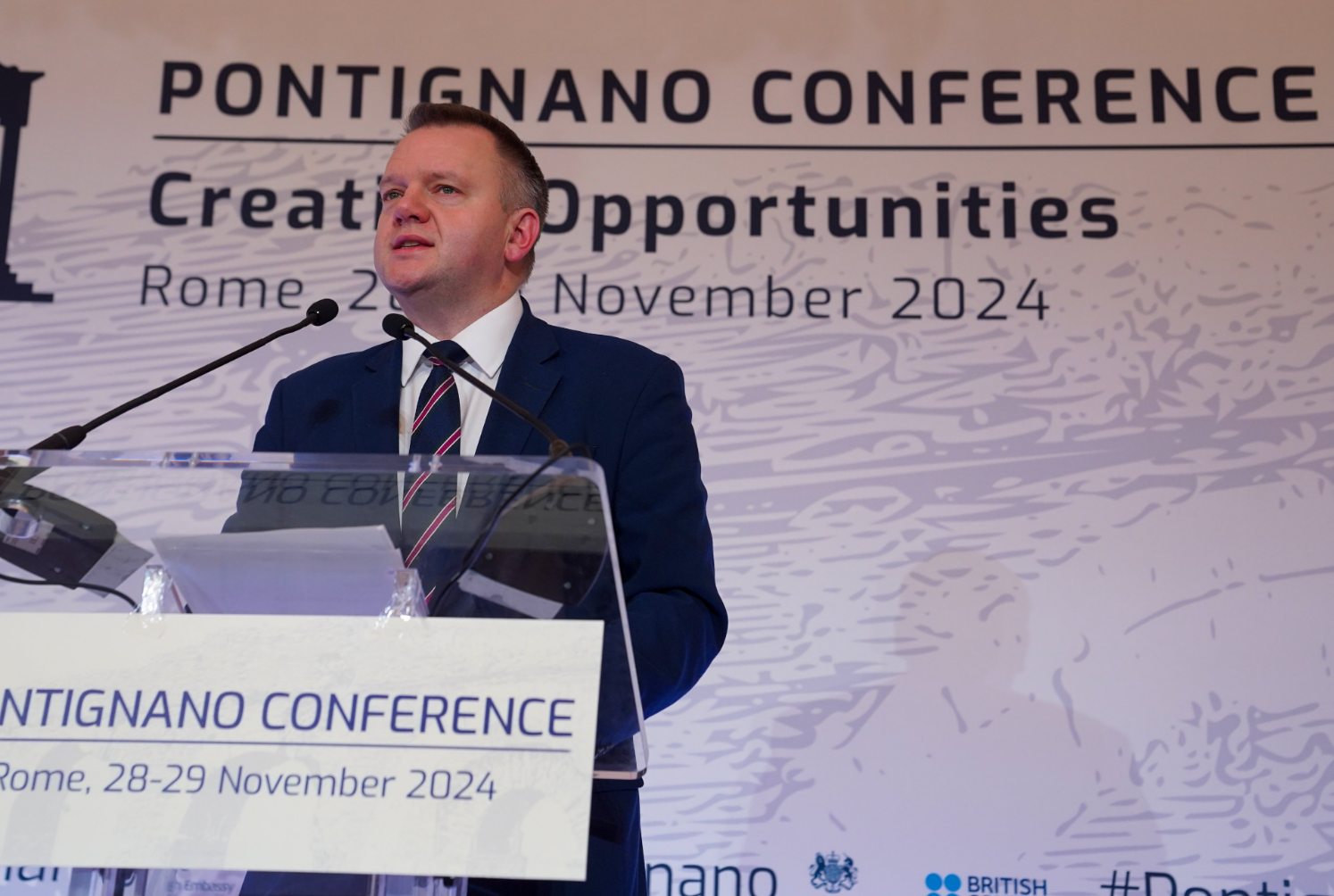Brexit & Beyond newsletter
3 December 2024
 Welcome to the 3 December 2024 Brexit & Beyond newsletter
Welcome to the 3 December 2024 Brexit & Beyond newsletter
Yesterday, the Secretary of State for Northern Ireland provided explanatory materials in relation to the democratic consent process on Articles 5-10 of the Windsor Framework. He also laid a written statement on the matter in Parliament. Assembly Members from the SDLP, Sinn Féin and Alliance have tabled the motion for the debate. The debate and vote are provisionally scheduled for Tuesday 10 December – this will be confirmed by the Assembly Business Committee today.
Last week at the Assembly, the Minister of Agriculture, Environment and Rural Affairs brought the draft Greenhouse Gas Emissions Trading Scheme (Amendment) (No. 2) Order 2024 to the Chamber to be approved.
The Windsor Framework Democratic Scrutiny Committee met to consider legal advice and departmental evidence on three EU Acts. It decided to conduct inquiries into two of them: Directive (EU) 2024/2853 on liability for defective products and Regulation (EU) 2024/2865 on classification, labelling and packaging (CLP) of substances and mixtures.
At Westminster, the House of Lords undertook the Committee stage of the Product Regulation and Metrology Bill and Baroness Anderson of Stoke-on-Trent responded on behalf of the Government to questions on Northern Ireland.
- Democratic Consent Mechanism
- Greenhouse Gas Emissions Trading Scheme (Amendment) (No. 2) Order 2024
- Windsor Framework Democratic Scrutiny Committee
- Product Regulation and Metrology Bill
- House of Lords Oral Questions: Northern Ireland
- Windsor Framework (Non-Commercial Movement of Pet Animals) Regulations
- UK-EU Relations
- Other news
Democratic Consent Mechanism
Yesterday, the Secretary of State for Northern Ireland provided explanatory materials in relation to the democratic consent process on Articles 5-10 of the Windsor Framework where the Assembly will vote on whether those Articles should continue to apply in Northern Ireland.
The guidance states that the arrangements made under Articles 5-10 Windsor Framework “are the arrangements concerning the trade in goods put in place to meet the Framework’s objectives to avoid a hard border on the island of Ireland, safeguard the Good Friday Agreement in all its dimensions, and protect Northern Ireland’s place in the United Kingdom and its internal market.”
The Secretary of State also laid a written statement on the matter in Parliament.
Assembly Members from the SDLP, Sinn Féin and Alliance have tabled the motion for the debate. The wording of the motion is laid out in the Northern Ireland Act 1998 - “That Articles 5 to 10 of the Protocol on Ireland/Northern Ireland to the EU withdrawal agreement should continue to apply during the new continuation period (within the meaning of Schedule 6A to the Northern Ireland Act 1998).” The motion is to be decided without amendment and the petition of concern mechanism does not apply.
The debate and vote are provisionally scheduled for Tuesday 10 December – this will be confirmed by the Assembly Business Committee today.
The flowchart below sets out the possible outcomes of the vote.

If you experience any issues with the flowchart, you can read this text version.
More information about the democratic consent mechanism is available on the Assembly’s website.
Greenhouse Gas Emissions Trading Scheme (Amendment) (No. 2) Order 2024
Last Tuesday the Minister of Agriculture, Environment and Rural Affairs brought the draft Greenhouse Gas Emissions Trading Scheme (Amendment) (No. 2) Order 2024 to the Chamber to be approved. He explained to the House the UK emissions trading scheme (ETS) was established in 2020 under the Climate Change Act 2008 by the Greenhouse Gas Emissions Trading Scheme Order 2020 as a UK-wide greenhouse gas emissions trading scheme to encourage cost-effective emissions reductions.
He continued that this “helps to contribute to the achievement of greenhouse gas reduction targets set in the Climate Change Act (Northern Ireland) 2022 along with wider UK emissions reduction targets and net zero goals. The scheme replaced the UK's participation in the EU emissions trading system (EU ETS) and came into force on 1 January 2021.”
The Minister said the aim of the ETS is to encourage reductions in emissions. It is “based on a cap and trade principle and requires participants to purchase and surrender a carbon allowance for each ton of carbon dioxide that they emit. The more carbon dioxide emitted, the more allowance is required. There are penalties for failure to obtain and surrender the requisite number of allowances.”
The Minister highlighted “an exclusion from the scope of UK ETS for Northern Ireland's six electricity generators, which remain in EU ETS to preserve the functioning of the single electricity market on the island of Ireland. If generators, North and South, were to participate in different emissions trading schemes, there could be a carbon price divergence, which could distort the operation of the single electricity market. To give some context of the scale, there are around 900 UK participants in the scheme and 17 in Northern Ireland, along with two registered aviation operations.”
We have reported previously on the potential implications for Northern Ireland of different emissions trading schemes in GB and the EU.
The Minister told Members that the Order includes Northern Ireland within the scope of the legislation made on a GB-only basis during the Assembly suspension, in addition to implementing net zero-aligned emissions.
The Chairperson of the Committee for Agriculture, Environment and Rural Affairs told the Chamber the Committee agreed to recommend that the Order be approved by the Assembly.
The Assembly approved the draft Greenhouse Gas Emissions Trading Scheme (Amendment) (No. 2) Order 2024.
Windsor Framework Democratic Scrutiny Committee
On Thursday, the Windsor Framework Democratic Scrutiny Committee met to consider legal advice and departmental evidence on Directive (EU) 2024/2853 on liability for defective products. The act updates rules around ‘strict liability’, where consumers can claim compensation for defective products without having to prove fault on the part of the manufacturer. It aims to enhance consumers’ access to compensation, for example by clarifying the application of liability rules to electronic goods that operate using software, such as autonomous vehicles.
The Committee decided to conduct an inquiry into the EU act. The Committee is holding an online survey and wants to hear from those who may be affected by the EU act. The survey closes on 8 December.
The Committee also received legal advice and considered departmental evidence on Regulation (EU) 2024/2865 on classification, labelling and packaging (CLP) of substances and mixtures, and decided to conduct an inquiry into this EU act. Departmental officials had previously given evidence to the Committee. The act amends the CLP Regulation, which implements the UN globally harmonised system (GHS) for classification and labelling of chemicals. It aims to protect human health and the environment while ensuring a level playing field for all suppliers of chemical substances and mixtures in the EU single market.
At the earlier evidence session, the Committee was also told that the Department for the Economy had “light-touch engagement” and experienced difficulties engaging with the chemicals sector. As part of its inquiry, the Committee is now seeking views on three key questions and wants to hear from representatives of business and civil society affected by the EU act, or would be so affected if the act enters into force.
Finally, the Committee received legal advice and considered departmental evidence on Regulation (EU) 2024/2847, the Cyber Resilience Act. The Committee decided not to conduct an inquiry into this EU act.
Product Regulation and Metrology Bill
Last week at Westminster, a Grand Committee of the House of Lords undertook the Committee stage of the Product Regulation and Metrology Bill. The Bill (as previously covered by Brexit and Beyond) contains measures concerning the UK’s product safety, regulation and metrology framework. The government states the current regulatory regime needs to be modernised because it is inflexible and limited in its ability to respond to new product risks and opportunities, advancements in modern supply chains and technology, and changes in EU law. It also says that, under the current framework, the UK lacks powers to end recognition of EU product regulations in Great Britain or to recognise new and updated ones, which could lead to additional costs and uncertainty for businesses. Line by line examination of the Bill took place during the second and third day of committee stage on 25 and 27 November. The Committee stage continues on 11 December when further amendments will be discussed.
House of Lords Oral Questions: Northern Ireland
On Wednesday 27 November, in the House of Lords, Baroness Anderson of Stoke-on-Trent responded on behalf of the Government to questions on Northern Ireland. Asked about the steps the Government is taking to strengthen Northern Ireland’s position within the United Kingdom, she said the Government is “committed to delivering for all communities in Northern Ireland by resetting the relationship with the NI Executive and working collaboratively to transform public services and champion investment opportunities.” Regarding the commitments made in Safeguarding the Union she said the government remains “committed to implementing the Windsor Framework in good faith and taking forward commitments in a way that best delivers for the people of Northern Ireland.”

Baroness Anderson informed the House that the East-West Council (which held its inaugural meeting in March 2024) set up under the Safeguarding the Union Command Paper is one of “the important structures of intergovernmental relations and institutions.” She said the Government “will use to improve relations and collaboration on policy.” Baroness Andrew also said that the “Council of the Nations and Regions is a manifesto commitment and core to the Government’s efforts resetting and normalising relations across the United Kingdom to deliver for the people of every corner of our country.”
Windsor Framework (Non-Commercial Movement of Pet Animals) Regulations
On the same day there was a motion in the House of Lords to approve the Windsor Framework (Non-Commercial Movement of Pet Animals) Regulations 2024. These Regulations provides for the introduction of the Northern Ireland pet travel scheme. The Parliamentary Under-Secretary of State, Department for Environment, Food and Rural Affairs (Baroness Hayman of Ullock) said:
“The framework represents an important step forward for the people of Northern Ireland by significantly improving on the arrangements that existed under the original Northern Ireland protocol. This Government have been very clear in their intention to secure new, better arrangements for sanitary and phytosanitary matters with the EU. We are clear that we want to continue to simplify this process as far as possible in order to support those across the United Kingdom, whilst protecting our internal market.”
UK-EU Relations
Last week, the Deputy Prime Minister, Angela Rayner and the Minister for EU Relations, Nick Thomas-Symonds spoke at the Pontignano Conference. The Conference is organised by the British Embassy in Rome and the British Council. It brings together current and future leaders from the UK and Italy to address common challenges and develop networks and close relationships.

Minister Thomas-Symonds also met with senior Italian political figures in Rome to discuss trade, security and resetting the UK's relationship with the European Union.
Other news
- The Guardian reports that Eurozone manufacturers see ‘no sign of recovery’ as UK orders slow.
- Lisa O’Carroll, writing for the Guardian, reports that “Centre-right Fianna Fáil and Fine Gael set to retain power in Ireland”
- Politico reports that the European Commission is set to propose new rules on deporting migrants entering the bloc illegally.
- Politico reports that Members of the European Parliament failed to agree a position on a decision on smoking and vaping restrictions.
- Heidi Alexander MP was appointed as the Secretary of State for Transport on 29 November 2024..



